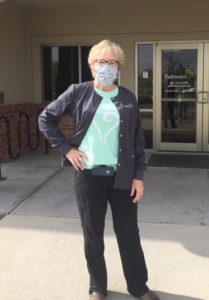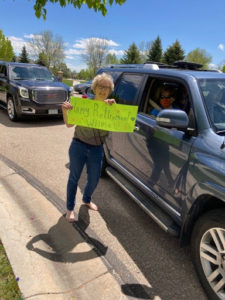A nurse with us for 30 years, Wilma Feeley retired from Pathways in May. Kind of.
If you’ve come through Pathways’ doors in the last 30 years, chances are you’ve felt the impact that nurse Wilma Feeley has had on us. Last month, she retired from service. Kind of.
Wilma started with us in 1989, after she’d been a practicing nurse for a decade. She worked at Poudre Valley Hospital through the 1980s, and felt herself drawn to caring for patients who were dying. She found value in providing comfort care for patients and their families. That’s how she found herself working for the local hospice.

Wilma Feeley on her last day at Pathways.
Initially, Wilma thought she’d only stay for a few years. Working in the field of death and dying usually does not make for a long career, she assumed. As you can tell, she never moved on.
“In hospice nursing, it feels like you get a complete picture of the whole person in a way that you don’t in any other specialty,” she reflected after her retirement. “You get to meet patients where they’re at, and to get them on the path of comfort care is satisfying.”
She’s learned a lot over the years, chiefly the importance of informing and supporting patient decisions about death. Wilma views her role as a nurse as one of guidance and education because those under her care have to make the decisions themselves.
The care she provided the uncountable patients she served allowed them to choose from more comfort options than others have available to them. She participated in a program with a sister hospice in Bulawayo, Zimbabwe ten years ago that illuminated the resources available to Pathways’ patients that are lacking in Zimbabwe. It also highlighted how important it is for patients to have a choice in their care.
The biggest myth about hospice care still persists past Wilma’s retirement. She wants families and patients alike to know that enrolling in hospice care doesn’t have to mean that death is imminent. Hospice care doesn’t change the progression of an illness, but we can help with your care journey, she asserted.
While no one can push someone to accept end of life care emotionally if they’re not ready, Wilma said she heard an overwhelming number of times that family members wish they’d enrolled in hospice sooner. And studies show that people can live longer under hospice care because their symptoms are managed better.

A retirement parade in Wilma’s honor.
From the first cell phone bricks and portable copier machines, to electronic patient records, Wilma has seen a lot of change at Pathways. She is keenly aware of how dramatically the hospice admissions process has evolved. In the beginning of Wilma’s hospice career, the agency was working with approximately 20 patients daily. Pathways now serves about 300 patients.
That increase in patients also contributed to the increased specialization she’s seen over the years. Wilma found her specific focus in admissions and hospital visits. In fact, she hasn’t completely retired from Pathways.

Wilma celebrated retiring to part-time status in May.
Working a couple days a week, Wilma will help with training our new admissions employees. She didn’t plan on staying, but then the coronavirus pandemic foiled her and her husband’s plans for traveling in their retirement.
“We empower families to care for their loved ones. Hospice staff might visit for an hour a day, but there’s another 23 hours that family members are providing the care. We give honest information to help families look at what they need to care for their loved one, but also themselves. We encourage and praise them, but we also help them understand the reality of the situation and face it with the right information”
Wilma won’t be visiting with clients any longer, but her dedication to Pathways will continue to be felt, even when she retires for real.

A collection of Wilma’s nametags from the past 30 years.




